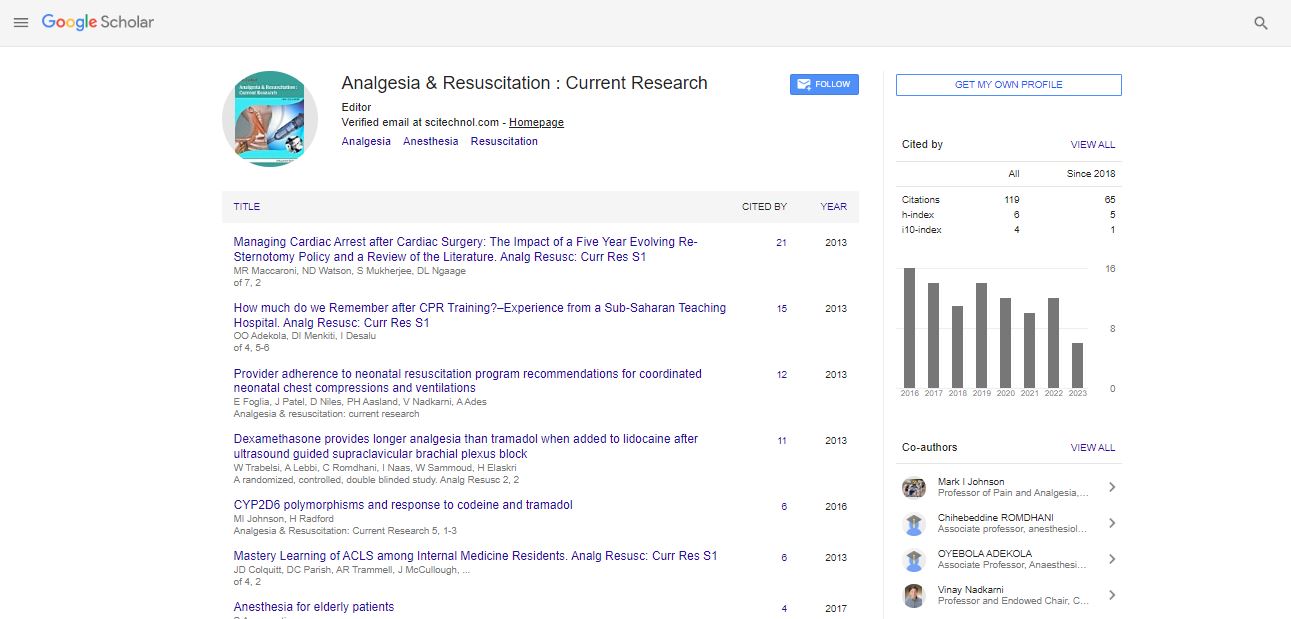Perspective, Analg Resusc Curr Res Vol: 12 Issue: 2
The Long-Term Effects of Methadone Maintenance Therapy
1Department of Physiology, Islamic Azad University, Isfahan, Iran
*Corresponding Author: Garben Joshua,
Department of Physiology, Islamic
Azad University, Isfahan, Iran
E-mail: josh.garben@med.edu
Received date: 28 May, 2023, Manuscript No. ARCR-23-105007
Editor assigned date: 31 May, 2023, Pre QC No. ARCR-23-105007 (PQ);
Reviewed date: 14 June, 2023, QC No. ARCR-23-105007
Revised date: 22 June, 2023, Manuscript No. ARCR-23-105007 (R);
Published date: 28 June, 2023, DOI: 12.4172/2324-903X.1000118
Citation: Joshua G (2023) The Long-Term Effects of Methadone Maintenance Therapy. Analg Resusc: Curr Res 12:2.
Description
Methadone Maintenance Therapy (MMT) is a well-established and evidence-based approach for the treatment of Opioid Use Disorder (OUD). It involves the long-term use of methadone, a synthetic opioid agonist, to help individuals reduce or eliminate their dependence on illicit opioids. While MMT has shown significant benefits in reducing drug use, preventing overdose deaths, and improving social functioning, it is crucial to understand the potential long-term effects of this treatment approach.
One of the primary long-term effects of MMT is the stabilization of individuals with OUD. Methadone, when administered in appropriate doses, helps alleviate opioid cravings and withdrawal symptoms, allowing individuals to regain control over their lives. By providing a stable opioid dose, MMT can help individuals achieve and maintain abstinence from illicit opioids, reducing their exposure to the risks associated with opioid misuse.
Moreover, long-term methadone use has been associated with a reduction in risky behaviors commonly associated with opioid addiction. Studies have shown that MMT decreases the frequency of opioid misuse, injection drug use, and engagement in criminal activities. By stabilizing individuals and reducing their reliance on illicit opioids, MMT helps break the cycle of drug-seeking behaviors and decreases the transmission of blood borne infections such as Human Immunodeficiency Virus (HIV) and hepatitis C. Another significant long-term effect of MMT is its positive impact on physical and mental health outcomes. Opioid addiction often takes a toll on an individual's overall health and well-being. With MMT, individuals have access to regular medical check-ups and support services, leading to improvements in physical health conditions. Furthermore, MMT has been associated with reductions in HIV transmission, mortality rates, and overdose-related deaths.
Mental health is also an important aspect affected by MMT. Opioid addiction is commonly associated with co-occurring mental health disorders such as depression, anxiety, and post-traumatic stress disorder. By providing stable opioid replacement therapy, MMT can alleviate the psychological distress associated with withdrawal and drug-seeking behaviors, improving overall mental health outcomes.
In addition to stabilizing individuals with OUD and improving physical and mental health outcomes, long-term methadone use has also been linked to various social benefits. MMT has been shown to enhance individuals' ability to engage in productive activities such as education, employment, and familial responsibilities. By reducing the burden of opioid addiction, MMT allows individuals to rebuild their lives and reintegrate into society. However, it is essential to acknowledge that there can be potential challenges and risks associated with long-term methadone use. Methadone is an opioid agonist and, as such, carries a risk of dependence and addiction. Regular monitoring and careful dose adjustments are crucial to ensure that individuals receive the appropriate dose of methadone while minimizing the risk of adverse effects.
Additionally, some individuals may experience side effects from long-term methadone use, such as constipation, sedation, and sexual dysfunction. However, these side effects can often be managed through proper medical supervision and support. Long-term methadone maintenance therapy has been shown to have significant positive effects on individuals with opioid use disorder. It stabilizes individuals, reduces drug use and risky behaviors, improves physical and mental health outcomes, and enhances social functioning. However, it is important to carefully monitor individuals on MMT to ensure appropriate dosing and address any potential risks or side effects. By providing comprehensive support and care, long-term methadone use can contribute to successful recovery and improved quality of life for individuals with opioid addiction.
 Spanish
Spanish  Chinese
Chinese  Russian
Russian  German
German  French
French  Japanese
Japanese  Portuguese
Portuguese  Hindi
Hindi 
